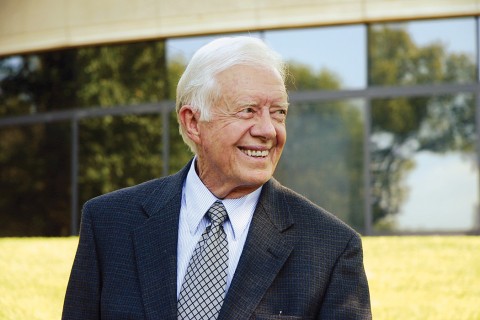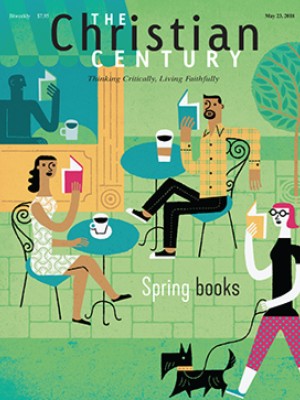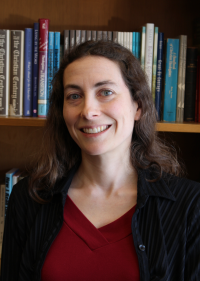
Jimmy Carter served as president of the United States from 1977 to 1981. In 1982, Carter and his wife, Rosalynn, founded the Carter Center, which works across the world to advance human rights and alleviate suffering. In 2002, Carter was awarded the Nobel Peace Prize for his peacemaking efforts. At age 93, he teaches courses at Emory University, volunteers with Habitat for Humanity, and teaches Sunday school at the Maranatha Baptist Church in Plains, Georgia. His new book, Faith: A Journey for All (Simon & Schuster), has just been released.
In Faith, you write, “I have faith that God is slowly bending eternity toward redemption, and that someday . . . moral perfection based on love as expressed by Jesus Christ will prevail.” What gives you a basis for this kind of hopefulness?
Read our latest issue or browse back issues.
The history of America gives me hope. We’ve been through some very trying times in the past, and the resilience of our country and the principles of our Constitution have always prevailed. I have confidence that in the future we’ll do the same thing, despite the difficulties we face today.
We went through a civil war to do away with slavery, and later we struggled to give women the right to vote in our democracy. In the 120 years since the “separate but equal” ruling of the Supreme Court, our judges have had to struggle with discrimination against African Americans. We’re still struggling with that. We’ve had a resurgence of discrimination in the last few years—and it’s against not only African Americans and other minorities but also immigrants. We have a great disparity in income, with people’s opportunities depending on how rich they are. There’s also a disparity of treatment within our judicial system. We have about seven and a half times as many people in prison now as we did when I left the White House, for instance, and we have the most prisons of any country on earth.
These problems have long existed, but they’ve been aggravated or brought to the attention of the public more recently, since the election. But in general, our country has proven able to deal with such struggles.
You note the divisions in our society that have increased sharply in recent decades—divisions rooted in political differences, racial tensions, economic inequality, and more. If you were president today, what would be your first steps toward mending those divisions?
I’d emphasize through public statements that I pledge to keep my country at peace and to be a champion of human rights. One of the things that America would like to be is a superpower, but there are more elements of being a superpower than just military strength. The United States of America ought to be seen by the rest of the world as a champion of peace, not war, a champion of human rights, a champion of equality, and a champion of generosity to help people in need. Those are the kind of values that need to be emphasized in the future of America, and I hope and pray that this will be the case.
If you had one final Sunday school class to teach, what would it be on? What Bible verses would you choose?
I change my Sunday school lesson every Sunday to accommodate modern-day headlines. But one of my favorite Bible verses is “Be ye kind one to another, as God through Jesus Christ has been kind to all of us” [Eph. 4:32]. And that’s a challenge. We now have the possibility of eliminating all living creatures on earth with the use of nuclear weapons. The next step in the evolution of human beings has to be learning how to live with each other in peace and with some degree of love. Jesus said we should not only love our neighbor but love our enemies [Matt. 5:43–44], which means loving those with whom we disagree. We have to learn how to get along with Russians and Muslims and North Koreans in a constructive spirit of care, instead of asking what’s the best excuse we have to go to war with them.
You define yourself as an evangelical based on beliefs (e.g., biblical authority, the centrality of grace, a born-again experience, spreading the Christian message). But many white Americans are now self-identifying as evangelicals based more on political stances than particular faith commitments. Do you think the term evangelical needs to be detached from politics and returned to the realm of faith, and if so, how might evangelical Christians begin to reclaim the term?
I wouldn’t try to change the definition. I don’t have that authority, and I don’t have that inclination. But I think of an evangelical as someone who has faith and tries to put that faith into practice and tries to convince other people to share that faith by setting an example. This is an active definition of faith rather than a passive faith. I think faith ought to be looked on as a verb; it’s more than just a noun.
Evangelicals are not just a group of Christians who are associated with the Republican political party. They’re people who have faith and are eager to share that faith with other people.
What do you think is the most misunderstood aspect of Christianity in our society today?
One of the misconceptions is the idea that Christianity is a restraining factor on life, that we get ourselves in something like a telephone booth and we’re restricted from all sides by our religious mandates and our religious rules. I look on my faith as a liberation. It opens up a vast new era, an expanded area of influence, and a great number of people who affect me. It gives me a sense of hope and a sense of confidence.
What’s your favorite hymn?
Like most Christians, I’d probably say “Amazing Grace.” I’ve been on the stage with Willie Nelson six times, and each time we’ve sung “Amazing Grace” together. He always moves the microphone away from my mouth because I don’t have a good voice. But it’s still one of my favorites.
What one book, besides the Bible, do you wish all American Christians would read?
I’ve had a lot of favorite books in my life. One that I read quite early in life, when I was about ten or 12 years old, was War and Peace. This book is primarily about the 1812 War and how Napoleon invaded Russia and was rejected. But it shows that the course of human events was affected not by powerful people—like the czar of Russia or Napoleon—but by the common ordinary people. I think that’s a lesson that we need to remember. The course of human events, the resolution of our basic questions, and the answering of our different challenges are ultimately dependent on the cumulative influence of ordinary citizens.
How does the work of the Carter Center reflect your faith?
The Carter Center has one commitment: to promote basic human rights in the broadest definition of the term. One of the human rights that we cherish is the chance to live in peace. We also believe that all people should have a good education, good health care, the chance to put into effect whatever talent or ability they have, and the right to a decent home. Rosalynn and I still build Habitat for Humanity houses every year.
What might you say to a young adult or teenager who is for the first time becoming involved in public engagement with politics?
At Emory University, where I teach, I remind the students that this is the freest time in their whole life. They are absolutely free to make judgments about their future and about the world around them. In a few years, almost every one of them will be married and have an obligation to a marital partner, or they’ll have an obligation to a company or law firm or school system, and they’ll be restricted in what they can do. Now they are not only free, but they are in an environment where they have a wide range of fellow students and professors from whom they can learn new ideas.
When students ask me what I think they ought to do after they graduate, I advise them, if they don’t have a job opportunity, to join the Peace Corps. My mother was in the Peace Corps when she was 70 years old, and her great-grandson (my grandson) was in the Peace Corps as well, so I have a special affinity for the Peace Corps. It provides a chance to learn about other people and invest part of your life in the well-being of other people.
Data suggest that church affiliation has declined greatly in each successive generation of Americans. How do you understand that trend, and what do you think we can learn from it?
At any time in history, we’ve seen that the people who are less sure of themselves, less self-reliant, or less arrogant turn to religion. And now in the evolving societies of the world—in Latin America, in Africa, and particularly in China—we see the most rapid growth in Christianity. On a global basis, religious competition over time between Islam and Christianity, or between the different forms of Christianity, is not unhealthy. It strengthens us to keep searching, to constantly have new ideas and implement them, and to apply religious beliefs in our daily life. That’s what I try to do as a Bible teacher, too.
If you could see God face to face, what’s the first thing you’d say? What’s the first question you’d ask?
That question was asked in USA Today magazine a few years ago, and the question a lot of people wanted to ask God was: “What is my purpose in life?” Questions of purpose are important. But I think I would be in a mode of thanksgiving.
As I’ve gotten older and older, I’ve changed more from entreaties—from asking God for things for the people I love—to just being thankful for the blessings that I’ve received. I try to remind myself during each day about all the wonderful things that God has let me have: not only life but also freedom to act as I want to. God has given every person not only life and freedom but also the capabilities to live a successful life—at least as measured by God. Those are wonderful gifts that we have received, and I try to remind myself to be thankful for them.
A version of this article appears in the print edition under the title “True evangelical hope.”






